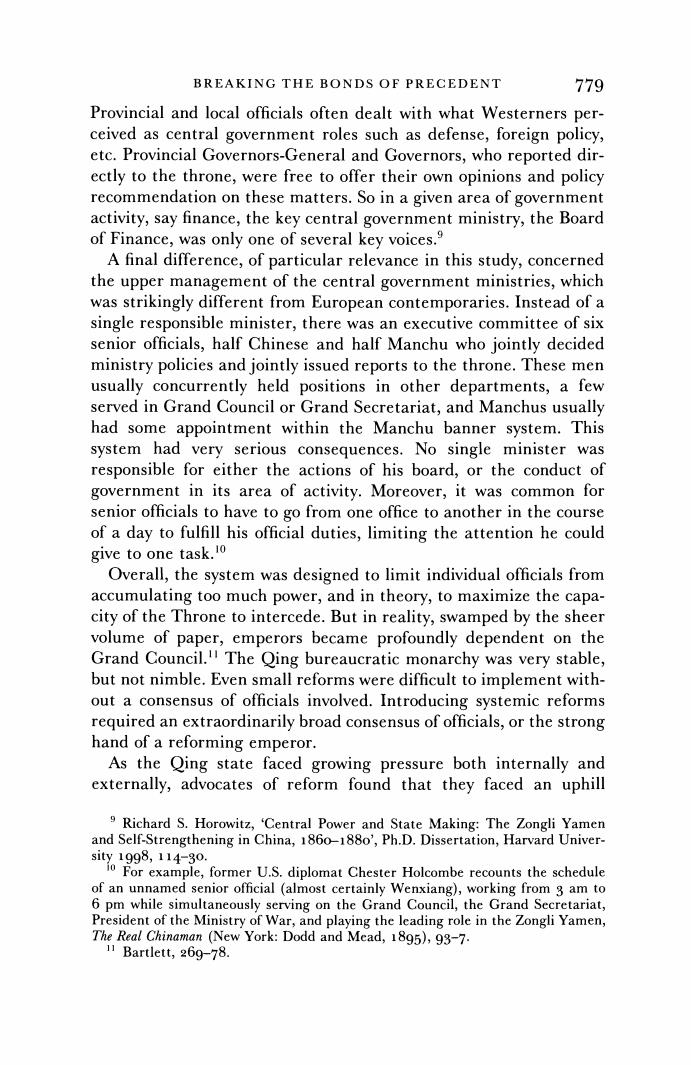正在加载图片...

BREAKING THE BONDS OF PRECEDENT 779 Provincial and local officials often dealt with what Westerners per- ceived as central government roles such as defense,foreign policy, etc.Provincial Governors-General and Governors,who reported dir- ectly to the throne,were free to offer their own opinions and policy recommendation on these matters.So in a given area of government activity,say finance,the key central government ministry,the Board of Finance,was only one of several key voices. A final difference,of particular relevance in this study,concerned the upper management of the central government ministries,which was strikingly different from European contemporaries.Instead of a single responsible minister,there was an executive committee of six senior officials,half Chinese and half Manchu who jointly decided ministry policies and jointly issued reports to the throne.These men usually concurrently held positions in other departments,a few served in Grand Council or Grand Secretariat,and Manchus usually had some appointment within the Manchu banner system.This system had very serious consequences.No single minister was responsible for either the actions of his board,or the conduct of government in its area of activity.Moreover,it was common for senior officials to have to go from one office to another in the course of a day to fulfill his official duties,limiting the attention he could give to one task.10 Overall,the system was designed to limit individual officials from accumulating too much power,and in theory,to maximize the capa- city of the Throne to intercede.But in reality,swamped by the sheer volume of paper,emperors became profoundly dependent on the Grand Council.The Qing bureaucratic monarchy was very stable, but not nimble.Even small reforms were difficult to implement with- out a consensus of officials involved.Introducing systemic reforms required an extraordinarily broad consensus of officials,or the strong hand of a reforming emperor. As the Qing state faced growing pressure both internally and externally,advocates of reform found that they faced an uphill 9 Richard S.Horowitz,'Central Power and State Making:The Zongli Yamen and Self-Strengthening in China,1860-1880',Ph.D.Dissertation,Harvard Univer- sity1998,114-30. io For example,former U.S.diplomat Chester Holcombe recounts the schedule of an unnamed senior official (almost certainly Wenxiang),working from 3 am to 6 pm while simultaneously serving on the Grand Council,the Grand Secretariat, President of the Ministry of War,and playing the leading role in the Zongli Yamen, The Real Chinaman (New York:Dodd and Mead,1895),93-7. 1 Bartlett,269-78.BREAKING THE BONDS OF PRECEDENT 779 Provincial and local officials often dealt with what Westerners perceived as central government roles such as defense, foreign policy, etc. Provincial Governors-General and Governors, who reported directly to the throne, were free to offer their own opinions and policy recommendation on these matters. So in a given area of government activity, say finance, the key central government ministry, the Board of Finance, was only one of several key voices.9 A final difference, of particular relevance in this study, concerned the upper management of the central government ministries, which was strikingly different from European contemporaries. Instead of a single responsible minister, there was an executive committee of six senior officials, half Chinese and half Manchu who jointly decided ministry policies and jointly issued reports to the throne. These men usually concurrently held positions in other departments, a few served in Grand Council or Grand Secretariat, and Manchus usually had some appointment within the Manchu banner system. This system had very serious consequences. No single minister was responsible for either the actions of his board, or the conduct of government in its area of activity. Moreover, it was common for senior officials to have to go from one office to another in the course of a day to fulfill his official duties, limiting the attention he could give to one task.'0 Overall, the system was designed to limit individual officials from accumulating too much power, and in theory, to maximize the capacity of the Throne to intercede. But in reality, swamped by the sheer volume of paper, emperors became profoundly dependent on the Grand Council." The Qing bureaucratic monarchy was very stable, but not nimble. Even small reforms were difficult to implement without a consensus of officials involved. Introducing systemic reforms required an extraordinarily broad consensus of officials, or the strong hand of a reforming emperor. As the Qing state faced growing pressure both internally and externally, advocates of reform found that they faced an uphill 9 Richard S. Horowitz, 'Central Power and State Making: The Zongli Yamen and Self-Strengthening in China, 186o-188o', Ph.D. Dissertation, Harvard University 1998, 114-30. 0o For example, former U.S. diplomat Chester Holcombe recounts the schedule of an unnamed senior official (almost certainly Wenxiang), working from 3 am to 6 pm while simultaneously serving on the Grand Council, the Grand Secretariat, President of the Ministry of War, and playing the leading role in the Zongli Yamen, The Real Chinaman (New York: Dodd and Mead, 1895), 93-7. " Bartlett, 269-78